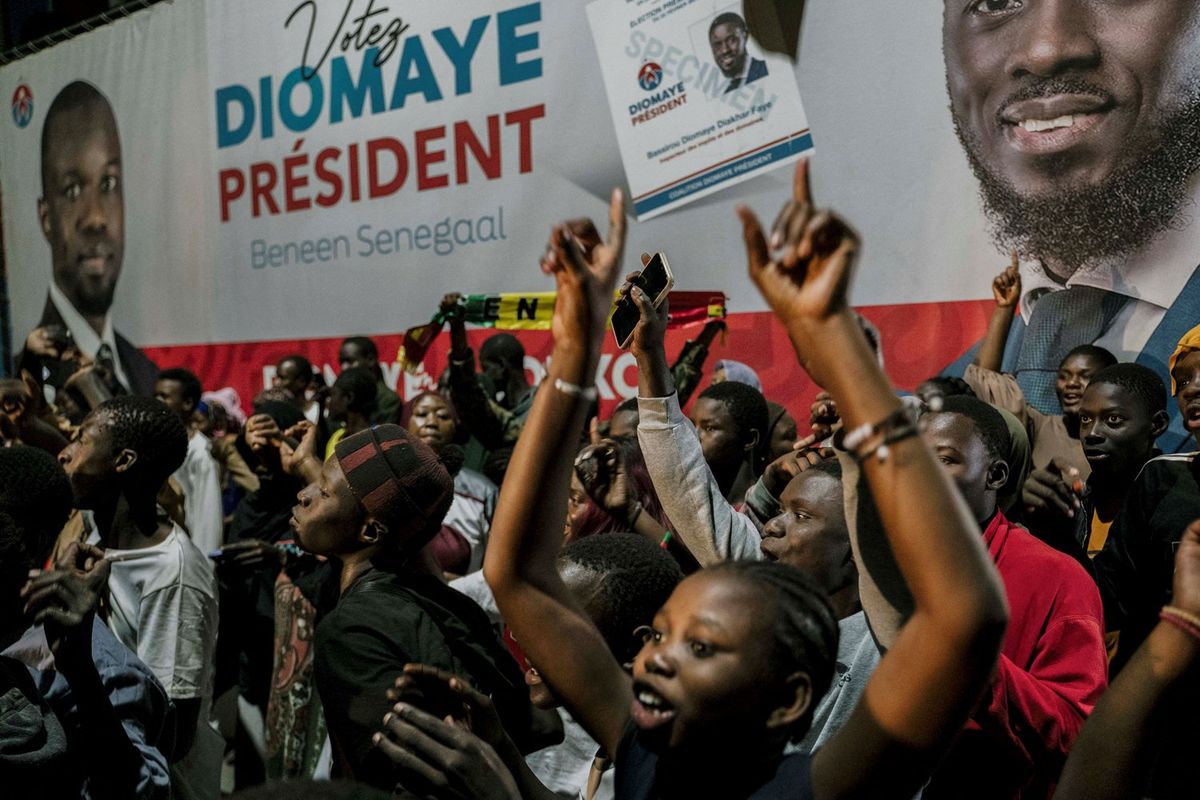Senegal May Be on the Verge of Electing its Youngest President Ever
Bassirou Diomaye Faye, 44, is set to replace outgoing President Macky Sall, with early results placing him in position to win over 50 percent of the votes in Sunday’s election.

Supporters gather outside anti-establishment candidate Bassirou Diomaye Faye's headquarters in Dakar on March 24, 2024, after voting closed in the presidential election.
Senegal’s former prime minister and ruling coalition candidate, Amadou Ba, has conceded defeat to popular opposition candidate, Bassirou Diomaye Faye, in Sunday’s presidential election. Government spokesman Abdoul Karim Fofana told journalists on Monday that Ba called Faye, a move that all but seals the entrance of a new president in the West African country.
In the early hours of Monday, supporters of Faye were already celebrating reports that the candidate had taken a sizable lead in early election results. Of over 7 million registered voters, state television RTI reports that turnout for the election was at 71 percent. Till now, it is still unclear how many of the 15,636 polling stations have had their votes counted, but several candidates have already congratulated Faye.
Anta Boubacar Ngom, the only woman amongst the 19 election hopefuls, was one of the first to congratulate Faye. “Congratulations to Mr. Bassirou Diomaye Faye for indisputable victory,” she wrote on X, adding that she hoped, “his mandate will bring prosperity and harmony to our nation.”
At 44 years old, Faye is set to become the youngest president in Senegalese history. Just about a week ago, he was released from detention, alongside opposition firebrand Ousmane Sonko, and his victory – pending final provisional results on Tuesday – is linked to his comradeship with Sonko. During their short but momentous campaign, the duo ran with the slogan “Diomaye is Sonko,” with Sonko ineligible to contest for president after a conviction for “corrupting youth.”
Although he only came third in the last election, with about 16 percent of the vote, Sonko became popular amongst Senegal’s youth, who were disgruntled by the country's uninspiring economy and a general souring on outgoing president Macky Sall. PASTEF, the political party founded by Sonko, was banned extrajudicially during last year’s deadly protests that stemmed from Sonko’s imprisonment.
Faye, also a former tax collector and alumni of the National School of Administration (ENA) like Sonko, was a leading PASTEF member, present at its founding and instrumental to Sonko’s 2019 presidential campaign. Faye served as PASTEF’s general secretary during the 2022 parliamentary elections, rallying the opposition alliance, “Liberate the People,” which won 56 seats.
Banned from contesting due to his conviction, Sonko threw his weight behind Faye and supporters were also jubilating in front of his house earlier today, due to the early reports that his chosen candidate was in the lead.
Previously, ex-Prime Minister Ba had stated that he was certain a runoff would be needed to determine the winner of the elections, disputing early projections that Faye would emerge with over 50 percent of the vote. Now, with his conceding call, Senegal is on course to witness another transfer of power to an opposition leader for the third time since 2000.
If Tuesday’s results finalize a win for Faye, he’ll be expected to take over almost immediately from Sall, who’s set to exit office on April 2. As incoming president, Faye carries the hopes of many Senegalese people, with expectations that he can reform the economy and rebuild the eroded trust between the government and the people, as evidenced by the difficult path that led to his election into office.- Here Are the Leading Candidates in Senegal’s Presidential Election ›
- Senegal’s Postponed Presidential Election Now Has a Date ›
- Senegal’s President Macky Sall Says He’ll Exit Office When his Term Ends, but Election Date Remains Uncertain ›
- Senegal Protests Result in First Confirmed Death ›
- Senegalese Opposition Leader Ousmane Sonko Returns to Prison ›
- How Bassirou Diomaye Faye went from Detention to President-Elect at 44 - Okayplayer ›
- Bassirou Diomaye Faye Sworn in as Senegal’s Youngest President Ever - Okayplayer ›
- None ›

